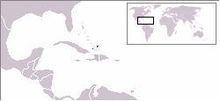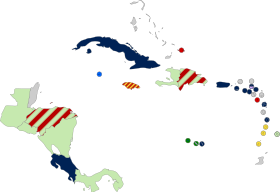| LGBTQ rights in Turks and Caicos Islands | |
|---|---|
 Turks and Caicos Islands Turks and Caicos Islands | |
| Status | Legal since 2001, unequal age of consent |
| Gender identity | No |
| Military | Yes |
| Discrimination protections | Yes, sexual orientation only |
| Family rights | |
| Recognition of relationships | No recognition of same-sex couples |
| Adoption | No |
Lesbian, gay, bisexual, and transgender (LGBT) persons in the British Overseas Territory of the Turks and Caicos Islands face legal challenges not experienced by non-LGBTQ residents. Same-sex sexual activity has been legal in the Turks and Caicos Islands since 2001, and discrimination based on sexual orientation is constitutionally banned.
Legality of same-sex sexual activity
Same-sex sexual acts were expressly decriminalised under the United Kingdom's Caribbean Territories (Criminal Law) Order, 2000, which took effect on 1 January 2001.
The law received considerable local media coverage. The two largest newspapers (one of each belongs to the two largest political parties) described the law as "an affront to our country" and "the sissy law".
The age of consent is higher for male (18) than it is for female (16).
Recognition of same-sex relationships

Same-sex marriages and civil unions are not legal in the Turks and Caicos Islands. Only opposite-sex marriage is constitutionally protected as Article 10 of the Constitution reads:
- Every unmarried man and woman of marriageable age (as determined by or under any law) has the right to marry a person of the opposite sex and found a family.
Discrimination protections
Article 16 of the Constitution bans discrimination based on sexual orientation:
- In this section, "discriminatory" means affording different treatment to different persons attributable wholly or mainly to their respective descriptions such as by race, national or social origin, political or other opinion, colour, religion, language, creed, association with a national minority, property, sex, sexual orientation, birth or other status whereby persons of one such description are subjected to disabilities or restrictions to which persons of another such description are not made subject or are accorded privileges or advantages which are not accorded to persons of another such description.
Living conditions
The Turks and Caicos Islands are considered a safe destination for LGBT tourists. LGBT people tend to face no discrimination issues in resorts and very touristic areas. Most Turks and Caicos inhabitants are quite tolerant of same-sex relationships. Several gay-themed cruise ships have also been allowed to port in the islands.
There are no known gay rights organisations in the Turks and Caicos Islands. Several government education programmes on HIV/AIDS have reached out to gay men, though.
Homophobia in the Turks and Caicos Islands is mostly religious-based. Following the passage of Proposition 8 in California, several religious preachers called on same-sex marriage to be constitutionally banned in island law. Religious groups have also opposed greater awareness and prevention of HIV/AIDS, erroneously claiming that straight men and women cannot get infected.
Summary table
| Same-sex sexual activity legal | |
| Equal age of consent | |
| Anti-discrimination laws in employment | |
| Anti-discrimination laws in the provision of goods and services | |
| Anti-discrimination laws in all other areas (incl. indirect discrimination, hate speech) | |
| Same-sex marriages | |
| Recognition of same-sex couples | |
| Stepchild adoption by same-sex couples | |
| Joint adoption by same-sex couples | |
| LGBT people allowed to serve openly in the military | |
| Right to change legal gender | |
| Access to IVF for lesbians | |
| Commercial surrogacy for gay male couples | |
| MSMs allowed to donate blood |
See also
- Politics of the Turks and Caicos Islands
- British overseas territories
- LGBT rights in the Commonwealth of Nations
- LGBT rights in the Americas
- LGBT rights by country or territory
- LGBT rights in the United Kingdom
- Recognition of same-sex unions in the British Overseas Territories
References
- State-sponsored Homophobia A world survey of laws prohibiting same sex activity between consenting adults Archived 17 July 2013 at the Wayback Machine
- "Caribbean Territories (Criminal Law) Order, 2000" (PDF). Retrieved 27 May 2018.
- ^ "Being Gay in Turks & Caicos Islands". globalgayz.com. Retrieved 27 May 2018.
- "03.08 Offences Against the Person Ordinance". Government of the Turks and Caicos Islands. Retrieved 11 April 2021.
- ^ "The Turks and Caicos Islands Constitution Order 2011" (PDF). Government of United Kingdom (legislation.gov.uk). Retrieved 30 January 2016.
- "Gay Guide to Turks and Caicos - GayTravel Guide for LGBTQ Travelers – Gay Bars & Clubs, Gay Friendly Hotels, Cruises, Tours, Events, Beaches, Weddings, Deals & Reviews". gaytravel.com. Retrieved 27 May 2018.
| LGBT rights in North America | |
|---|---|
| Sovereign states | |
| Dependencies and other territories | |
| LGBT unions and rights in the territories of the United Kingdom | |||||||
|---|---|---|---|---|---|---|---|
| Same-sex marriage |
| ||||||
| Same-sex unions |
| ||||||
| LGBT rights |
| ||||||
This article about lesbian, gay, bisexual, or transgender-related law is a stub. You can help Misplaced Pages by expanding it. |
This Turks and Caicos Islands–related article is a stub. You can help Misplaced Pages by expanding it. |
